八年级下册英语第一单元
人教版八年级英语下册 Unit 1 What’s the matter?知识点复习

人教版英语八年级下册第一单元知识点过关Unit 1 What’s the matter?一、重点短语1. have a fever 发烧,具体运用:She has a fever and she should lie down and rest.2. have a cough 咳嗽,cough既可以作名词,也可以作动词3. have a toothache 牙疼;tooth牙齿+ ache疼痛toothache 牙痛4. talk too much 说得太多;类似短语:eat too much吃太多5. drink enough water 喝足够的水;take enough money带够钱6. have a cold 受凉、感冒;也可以用catch a cold7. have a stomachache 胃疼;stomach胃+ache疼痛stomachache 胃疼8. have a sore back 背疼;sore疼痛+back背sore back背疼9. have a sore throat 喉咙痛10. lie down and rest 躺下休息11. hot tea with honey 加蜂蜜的热茶;with表示“带有”12. see a dentist 看牙医;看医生用“see”13. get an X-ray 拍X 光片14. take one’ s temperature 量体温;量体温、服药都用“take”15. put some medicine on sth. 在……上面敷药;例如:put some medicine on the cut在切口处敷药16. feel very hot 感到很热;feel感官动词,后接形容词17. sound like 听起来像;例如:sounds like a good idea 听起来像个好主意18. all weekend 整个周末;类似短语:all day \ all night \ all month19. in the same way 以同样的方式20. go to a doctor 看医生21. go along 沿着……走;类似短语:walk along22. on the side of the road 在马路边23. shout for help 大声呼救24. without thinking twice 没有多想;without是介词,后接动词ing形式25. get off 下车;反义词get on上车26. have a heart problem 患有心脏病27. to one’ s surprise 使....... 惊讶的;例如:to my surprise \ to his surprise28. thanks to 多亏了、由于;例如:Thanks to the the doctors , the patient was saved in time. 多亏了医生们,这个病人及时被救了。
最全面人教版八年级下册英语第一单元知识点归纳总结

Unit 1 What's the matter?一、词汇与短语◆重点单词A部分1.matter n. 问题;事情2.sore adj. 疼痛的;酸痛的3.stomachache n. 胃痛;腹痛4.foot n. 脚;足5.neck n. 颈;脖子6.stomach n. 胃;腹部7.throat n. 咽喉;喉咙8.hurt v. (使)疼痛;受伤9.fever n. 发烧10.passenger n. 乘客;旅客11.lie v. 躺;平躺12.break n. 间歇;休息13.rest v. &n. 放松;休息14.onto prep. 向;朝15.X-ray n. X射线;X光16.trouble n. 问题;苦恼17.toothache n. 牙痛18.hit n. (用手或器具)击;打19.headache n. 头痛20.herself pron. (she的反身代词)她自己21.off adv. & prep. 离开(某处);不工作;从……去掉B部分1.bandage n. 绷带v. 用绷带包扎2.press v. 压;挤;按3.sick adj. 生病的;有病的4.knee n. 膝;膝盖5.breathe v. 呼吸6.knife n. 刀7.sunburned adj. 晒伤的8.blood n. 血9.ourselves pron. (we反身代词)我们自己10.mean v. 意思是;打算11.climber n. 登山者;攀登者12.importance n. 重要性;重要13.risk n.&v. 危险;风险;冒险14.decision n. 决定;抉择15.accident n.(交通)事故;意外遭遇16.control v.&n. 限制;约束;管理17.situation n. 情况;状况18.spirit n. 勇气;意志19.kilo( = kilogram) n. 千克;公斤20.death n. 死;死亡21.rock n. 岩石22.nurse n. 护士◆重点短语A部分1.have a cold 感冒2.lie down 躺下3.have a stomachache 胃痛4.take one's temperature 量体温5.have a fever 发烧6.to one's surprise 使……惊讶的是7.get off 下车8.right away 立即;马上9.take breaks (take a break) 休息10.talk too much 说得太多11.drink enough water 喝足够的水12.have a very sore throat 嗓子非常疼13.get an X-ray 拍X光片14.see a dentist 看牙医15.drink some hot tea with honey 喝一些加蜂蜜的热茶16.put some medicine on sth.在……上面敷一些药17.feel very hot 感到很热18.sound like 听起来像19.all weekend 整个周末20.in the same way 以同样的方式21.go to a doctor 看医生22.go along 沿着……走23.on the side of the road 在马路边24.shout for help 大声呼救25.without thinking twice 没有多想26.have a heart problem 有心脏病27.thanks to 多亏了;由于28.in time 及时29.save a life 挽救生命30.get into trouble 陷入麻烦31.hurt oneself 受伤32.fall down落下;摔倒B部分1.be used to 习惯于……;适应于……2.in a difficult situation 在困境中3.take risks (take a risk) 冒险4.keep on doing sth. 继续(或坚持)做某事5.run out (of) 用尽;耗尽6.make a decision 作出决定7.cut off 切除8.get hit on the head 撞到头部9.get out of 离开;从……岀来10.be interested in 对……感兴趣11.give up 放弃12.mean doing sth. 意味着做某事13.put a bandage on sth. 用绷带包扎…14.lose one's life 失去生命15.feel sick 感到恶心16.mountain climbing 登山运动17.have problems breathing 呼吸困难18.be in control of 掌管;管理◆重点句子A部分1.What's the matter with you?=What's the trouble with you?=What's wrong with you?你怎么了?2.What should she do? 她该怎么办呢?3.Did you fall down? 你跌倒了吗?4.Should I take my temperature? 我应该量一下体温吗?5.I think I sat in the same way for too long without moving.我想我以同样的姿势一动不动地坐得太久了。
最新人教版八年级英语下册第一单元知识点汇总

最新人教版八年级英语下册第一单元知识点汇总Unit 1 What’s the matter?一、基础知识1.我感冒了。
可以表达为I had a cold、catch a cold或have the flu。
have a fever表示发烧,have a cough表示咳嗽,have a stomachache或肚子疼表示胃疼,have a toothache表示牙疼,have a headache表示头疼。
2.将身体部位和ache(疼痛)结合起来构成新的复合词,如stomach+ache=stomachache,head+ache=headache,tooth+ache=toothache,back+ache=backache,表示相应的疼痛。
3.“怎么啦?出什么事情了?”可以表达为What’ s the matter。
也可以用What’ s the trouble with you?或What’ s wrong with you。
matter和trouble为名词,其前可加the或形容词性物主代词,而wrong是形容词不能加the。
用于询问某人有什么病或遇到什么麻烦、问题,其后跟询问对象时,与介词with连用,如What’s the matter with sb。
= What’s your trouble?= What’s up?= What happens to sb。
举例来说,当问到“What’s the matter with you?”时,回答可以是“I have a bad cold.”4.maybe表示“或许”,常用于句首,表示可能性,后加句子。
例如Maybe you are right。
may be是情态动词+be的结构,意为“可能,也许”,后加名词、代词或形容词。
例如He maybe angry。
sound like可以和名词、代词以及从句结合使用,如It sounds like you don’t know the truth.It sounds like a good idea。
八年级下册英语第一单元讲义

Unit 1 What’s the matter?第一部分:重点语法讲解:1. Should 用法:should 是情态动词词,意思是“应该,应当”表示劝告,建议或命令。
没有人称和数的变化形式,后面接动词原形。
(1)You should drink much water.(2)否定句: You should not drink much water.(3)—It’s cold outside. Should I close the window?—Yes, you should. No, you should not.2. 我们学到的用英语提建议的句型还有:(1) Shall I /we +do sth ?(2) Let’s do sth.(3) What/how about doing sth?(4) Why not do sth= Why don’t you do sth ?(5) You’d/ we’d better (not )do sth?3. 跟踪练习题一.单项选择:1. —_________ we go to visit the Great Wall tomorrow?—Good idea.A. ShallB. WillC. MustD. May2. Let’s __________ a party this Sunday at school.A. to haveB. haveC. havingD. had3. What __________helping her with her English?A. toB. ofC. aboutD. finish4. Why not ___________ your homework on time?A. to finishB. finishingC. finishedD. finish5. If you have a headache, I think you __________ see a doctor.A. willB. shallC. shouldD. can二.按要求改写句子,每空一词。
人教版(新目标)初中英语八年级下册Unit 1
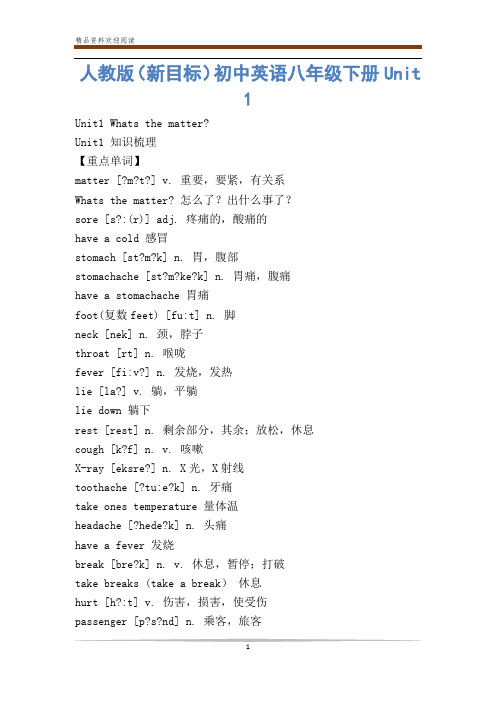
人教版(新目标)初中英语八年级下册Unit1Unit1 Whats the matter?Unit1 知识梳理【重点单词】matter [?m?t?] v. 重要,要紧,有关系Whats the matter? 怎么了?出什么事了?sore [s?:(r)] adj. 疼痛的,酸痛的have a cold 感冒stomach [st?m?k] n. 胃,腹部stomachache [st?m?ke?k] n. 胃痛,腹痛have a stomachache 胃痛foot(复数feet) [fu:t] n. 脚neck [nek] n. 颈,脖子throat [rt] n. 喉咙fever [fi:v?] n. 发烧,发热lie [la?] v. 躺,平躺lie down 躺下rest [rest] n. 剩余部分,其余;放松,休息cough [k?f] n. v. 咳嗽X-ray [eksre?] n. X光,X射线toothache [?tu:e?k] n. 牙痛take ones temperature 量体温headache [?hede?k] n. 头痛have a fever 发烧break [bre?k] n. v. 休息,暂停;打破take breaks (take a break)休息hurt [h?:t] v. 伤害,损害,使受伤passenger [p?s?nd] n. 乘客,旅客off [?f] adv. prep. 离开(某处);从去掉get off 下车to ones surprise 使惊讶,出乎意料onto [nt?] prep. 向,朝trouble [?tr?bl] n. 麻烦,烦扰,问题hit [hit] n. v. 碰撞,打,打击right away 立即,马上get into 陷入,参与herself [h?:?self] pron. 她自己,她本身(she的反身代词)bandage [b?nd?d?] n. v. 绷带;用绷带包扎sick [s?k] adj. 患病的,不适的knee [ni:] n. 膝盖nosebleed [?nzbli:d] n. 鼻出血breathe [bri:e] v. 呼吸sunburned [?s?nb?:nd] adj. 晒伤的ourselves [ɑ:?selvz] pron. 我们自己(we的反身代词)climber [?kla?m?(r)] n. 登山者be used to 习惯于适应于risk [r?sk] n. v. 风险,危险;冒险take risks (take a risk) 冒险accident [ksid?nt] n. 意外事件;事故situation [?sitju?ein] n. 状况,形式,情况kg=kilogram [?k?l?gr?m] n. 公斤,千克rock [r?k] n. 岩石run out (of) 用尽,耗尽knife [naif] n. 刀,餐刀cut off 切除blood [bl?d] n. 血mean [mi:n] v. 意味着,意思是,意欲get out of 离开,从出来importance [?m?p?:tns] n. 重要性decision [d?sn] n. 决心,决定,抉择control [k?ntrl] v. 控制,支配,操纵be in control of 掌管,管理spirit [sp?r?t] n. 勇气,意志death [de] n. 死亡give up 放弃nurse [n?:s] n. 护士【重点短语】1.have a fever 发烧2.have a cough 咳嗽3.have a toothache 牙疼4.talk too much 说得太多5.drink enough water 喝足够的水6.have a cold 受凉;感冒7.have a stomachache 胃疼8.have a sore back 背疼9.have a sore throat 喉咙痛10. take risks 冒险11.hot tea with honey 加蜂蜜的热茶12.see a dentist 看牙医13.get an X-ray 拍X 光片14.take one s temperature 量体温15.put some medicine on sth. 在上面敷药16. give up 放弃17. sound like 听起来像18. all weekend 整个周末19. in the same way 以同样的方式20. go to a doctor 看医生21. go along 沿着走22. on the side of the road 在马路边23. shout for help 大声呼救24. without thinking twice 没有多想25. get off 下车26. have a heart problem 有心脏病27. to one s surprise 另某人惊讶的是28. thanks to 多亏了;由于29. in time 及时30. make a decision 做出决定31. get into trouble 造成麻烦32. right away 立刻;马上33. because of 由于34. get out of 离开;从出来35. keep on doing sth. 继续或坚持做某事36. put a bandage on sth. 用绷带包扎37. fall down 摔倒38. feel sick 感到恶心39. have a nosebleed 流鼻血40. cut his knee 割伤他的膝盖41. put her head back 把她的头向后仰42. have problems breathing 呼吸困难43. mountain climbing 登山运动44. be used to doing sth. 习惯做某事45. run out (of) 用完;用尽46. so that 以便47. so...that... 如此以至于...48. be in control of 掌管;管理49. in a difficult situation 在闲境中【重点句型】1. Whats the matter with you?= Whatthe trouble with you?= Whats wrong with you? 你怎么了?2. What should she do? 她该怎么办呢?3.Should I take my temperature? 我应该量一下体温吗?4.You should lie down and rest. 你应该躺下休息一会儿。
英语八年级下册第一单元笔记

英语八年级下册第一单元笔记一、重点单词。
1. matter.- n. 问题;事情。
例如:What's the matter?(怎么了?)- v. 重要;要紧。
例如:It doesn't matter.(没关系。
)2. stomachache.- n. 胃痛;腹痛。
这是一个合成词,由“stomach(胃)+ache(疼痛)”构成。
3. foot.- n. 脚;足。
复数形式是“feet”。
例如:I hurt my feet.(我伤到我的脚了。
)4. neck.- n. 颈;脖子。
5. fever.- n. 发烧。
例如:He has a high fever.(他发高烧了。
)6. lie.- v. (lay - lain)躺;平躺。
例如:You should lie down and rest.(你应该躺下休息。
)- v. 说谎。
过去式是“lied”,过去分词是“lied”。
例如:He lied to me.(他对我撒谎了。
)7. rest.- v. & n. 放松;休息。
例如:Let's have a rest.(让我们休息一下吧。
)8. cough.- v. & n. 咳嗽。
例如:He coughs a lot.(他咳嗽得很厉害。
)9. X - ray.- n. X射线;X光。
10. toothache.- n. 牙痛。
也是合成词,“tooth(牙齿)+ache(疼痛)”。
二、重点短语。
1. have a cold.- 感冒。
例如:I have a cold. I feel terrible.(我感冒了。
我感觉很糟糕。
)2. have a stomachache.- 胃痛;肚子疼。
3. lie down.- 躺下。
4. take one's temperature.- 量体温。
例如:You should take your temperature first.(你应该先量一下体温。
人教版八年级下册英语第一单元知识点
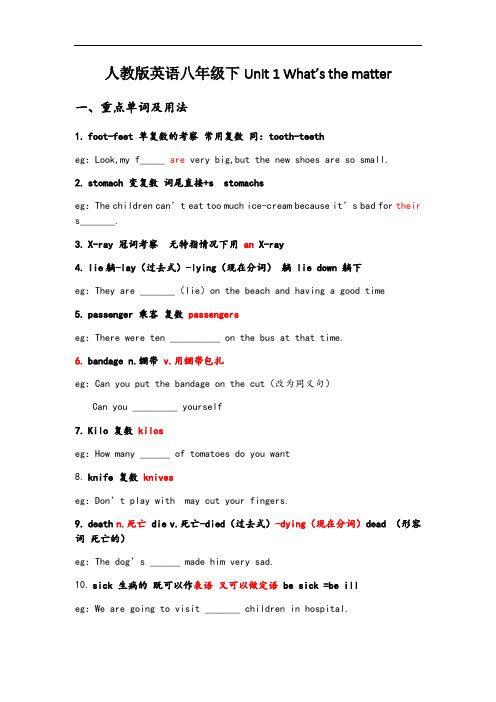
人教版英语八年级下Unit 1 What’s the matter一、重点单词及用法1.foot-feet 单复数的考察常用复数同:tooth-teetheg:Look,my f_____ are very big,but the new shoes are so small.2.stomach 变复数词尾直接+s stomachseg:The children can’t eat too much ice-cream because it’s bad for their s_______.3.X-ray 冠词考察无特指情况下用an X-ray4.lie躺-lay(过去式)-lying(现在分词)躺 lie down 躺下eg:They are _______(lie)on the beach and having a good time5.passenger 乘客复数passengerseg:There were ten __________ on the bus at that time.6.bandage n.绷带v.用绷带包扎eg:Can you put the bandage on the cut(改为同义句)Can you _________ yourself7.Kilo 复数kiloseg:How many ______ of tomatoes do you want8.knife 复数kniveseg:Don’t play with may cut your fingers.9.death n.死亡 die v.死亡-died(过去式)-dying(现在分词)dead (形容词死亡的)eg:The dog’s ______ made him very sad.10.sick 生病的既可以作表语又可以做定语 be sick =be illeg:We are going to visit _______ children in hospital.二、重点短语have a cold =catch a cold =have the flu 感冒 cough 咳嗽lie down 躺下take one’s temperature 量体温 have a fever 发烧take/have breaks/a break 休息=take/have a rest get off 下车-get on 上车to one’s surprise 令某人惊讶的是 right away 立刻马上=right nowget into (trouble)陷入(麻烦) get sunburned 被晒伤be used to (doing)习惯于适应于...... take risks/a risk 去冒险run out (of)用完用尽 cut off 切除get out of 离开从......出来 be in control of 掌管管理give up (doing)放弃(做)某事 have a stomachache 胃痛get an X-ray 做一个X射线检查 thanks to......由于多亏in time 及时 on time 准时 think about 考虑think of认为fall down 摔倒 make a decision 作决定put......on......把....放在...上 be interested in 对...感兴趣三、用法总结1.need to do sth需要做某事eg: The teacher needs_____(rest) for a few minutes.like 意为“听起来像”后接n./adj./句子eg: It sounds like a good idea.类似的感官动词+like:feel like/smell like/ look like/taste like/seem likesound+adj. 结构中,sound 是系动词意为“听起来是”后接形容词eg: That sounds great.+n./doing(v.现在分词) He went to school without having breakfast.eg:He left the classroom without ________ anythingv.同意,赞成agree with sb/某人的意见看法 Does she agree with usagree to do sth 同意做某事 They agreed to solve the problem. problems (in) doing sth做某事有困难=have trouble/difficulty (in) doinghave problems with sth =have trouble/difficulty with sth 在某方面有困难eg:One of my good friends said he had problems__________(learn) English. get used to doing sth 习惯于做某事eg:He used to get up late,but now he is used to getting up early.used to do sth 过去常常做某事(现在不做了)eg:He used to read English in the evening.use sth to do sth 使用用某物做某事eg:So he used knife to cut off his arm.be used to do sth 被动被用于做某事eg:These new pens are used to paint the wall.one’s life 丧失生命 save one’s life 挽救某人的生命eg:He lost his life in the car accident.adj.足够的充足的后接名词n. enough moneyadv.足够地修饰形容词/副词 enough要后置eg:The book is_______,but I don’t have enough money ______it.interesting; to buy enough; to buyenough; buying interesting; buying9. the importance of (doing)sth (做)某事的重要性important adj.重要的 unimportant adj.不重要的 importance n.重要性eg:We students should know the importance of (learning)English. n.决定 make a decision (to do sth)decide to do sth 决定做某事 decide not to do sth 决定不做某事eg:Tom made a decision to study English well.up 放弃give up 是动词+副词结构接代词作宾语时代词放中间eg:The problem is so difficult for you,but don’t _______A.give it up it out up it out itgive up doing sth 放弃做某事eg:You will be very sad if you give up______(sing).用法keep on doing sth 继续做某事(中间有间隔强调重复性)eg:He kept on studying though he was very tired.keep doing sth 继续不停地做某事(不间断连续性)eg:Keep walking until you reach the end of the road.keep sb doing 让某人一直做某事eg:Don’t keep the other students waiting.keep sb from doing sth 阻止某人做某事eg:We should keep the little boy from stepping on the grass.用法find找到,强调寻找的结果 look for强调寻找过程 find out找出查明eg:I was looking for my watch,but I didn’t find it.find sb doing sth 发现某人正在做某事eg:When I walked along the road,I found an old man shouting for help.find it +adj形容词+to do sth 发现做某事是...的eg:She found it hard to finish the work by herself.risks=take a risk 冒险 He likes taking risks.risk one’s life to do 冒着生命危险去做某事eg:He risked his life to save the child.risk doing stheg: The man called Tom often risks flying over the sea.四、短语辨析1.see sb doing sth 看见某人正在做某事(动作正在发生)see sb do sth 看见某人做某事(看到动作全过程或者经常看到动作发生)eg:I saw the boy crying when I passed by(路过).类似的 hear/watch/notice/find+sb do/doing sththanks to 多亏... 由于....=with the help of/with one’s help=because ofthanks for 因.......而感谢强调感谢的原因eg:Thanks to my teacher ,I passed the exam.Thanks for your help .Thanks for inviting me.2.in time 及时表示动作在规定时间内或比规定时间提前发生on time 准时按时指正好在规定时间内eg:Thanks for coming here to help me in time.The train arrived into the station on time.火车准时进站了。
人教版英语八年级下册单元Unit 1 知识点+测试卷+思维导图

Unit 1 What’s the matter?1.重点词汇:foot, knee, neck, stomach, throat, matter, cough, fever, headache, stomachache, toothache, nurse, blood, rest, X-ray, situation, spirit, trouble, death, hit, hurt, lie ...2. 短语归纳:1. have a cold 感冒2. have a stomachache 胃痛3. lie down 躺下4. take one’s temperature 量体温5. have a fever 发烧6. take breaks (take a break) 休息7. get off 下车8. to one’s surprise 使……惊讶的;出乎……意料9. right away 立即,马上10. get into陷入;参加11. be used to习惯于……;适应于……12. take risks (take a risk) 冒险13. run out (of) 用尽,耗尽14. get out of离开;从……出来15. be in control of 掌管;管理16. give up放弃3. 必背典句:1. -What’s the matter? -I have a stomachache.-你怎么了?-我胃痛。
2. -What’s the matter with Ben? -He hurt himself.-本怎么了?-他弄伤了自己。
3. -Does he have a toothache? -Yes, he does.-他牙疼吗?-是的,他牙疼。
4. -What should she do? -She should take her temperature.-她应该做什么?-她应该量体温。
八年级英语下册 Unit1 核心词汇

八年级英语下册Unit1核心词汇教材核心词汇知识链接及典例解读一、used to曾经教材原句You used to share food with me!你过去常与我分享食物!背例句学搭配His parents used to live in the countryside.他的父母过去住在乡下。
固定搭配used to do sth. 意为“过去经常做某事,以前常常做某事”,表示过去的习惯。
本身已是过去时态,没有人称和数的变化,暗含现在已不再如此。
易混辨析be used to doing sth.习惯于做某事My father is used to reading newspapers after dinner.我父亲习惯晚饭后读报。
be used to do 被用来做……A pen is used to write with.笔是用来写的。
典例解读1.My father _____________in a small village when he was a small child.A.used to living B.was used to liveC.used to live D.use to live【答案】C【解析】句意:我父亲小时候住在一个小村庄。
be used to doing sth.习惯于做某事,used to do sth.过去常常做某事,固定搭配。
根据时间状语从句when he was a small child可知,此处是“我父亲过去常常住在一个小村庄。
故选C。
2.My father _______ working on the farm, but he is a driver now.A.is used to B.was used to C.used to D.gets used to【答案】B【解析】句意:我父亲过去在农场工作,但他现在是一名司机。
根据but he is a driver now 可知,前面应该是表示过去发生的事情,排除A和D;be used to doing sth.习惯于做某事,used to do sth.过去常常做某事,固定搭配。
八下英语第一单元知识点归纳

八下英语第一单元知识点归纳The first unit in Grade 8 English covers a variety of topics, including greetings, introductions, and talking about likes and dislikes. Through learning these topics, students will be able to communicate effectively in English and express their preferences and opinions. This unit introduces basic vocabulary and sentence structures that are essential for daily conversations, such as "Hello, my name is…" and "I like/dislike." It lays a foundation for students to build upon as they progress in their English language learning journey.第八年级英语的第一个单元涵盖了各种主题,包括问候、介绍和谈论喜好和厌恶。
通过学习这些主题,学生将能够有效地用英语交流,并表达他们的喜好和观点。
这个单元介绍了基本的词汇和句型结构,对于日常对话至关重要,比如“你好,我叫……”和“我喜欢/不喜欢。
” 它为学生奠定了基础,以便他们在英语学习之旅中不断进步。
In addition to language skills, the first unit also focuses on cultural understanding and appreciation. Students learn about different greetings and customs in English-speaking countries, which helps broaden their horizons and develop a sense of global awareness. Byunderstanding and respecting cultural differences, students can become more open-minded and tolerant individuals. This unit fosters not only language proficiency but also cultural competence, preparing students to interact with people from diverse backgrounds.除了语言技能,第一个单元还侧重于文化理解和欣赏。
人教版英语八年级下册Unit1 知识点精讲
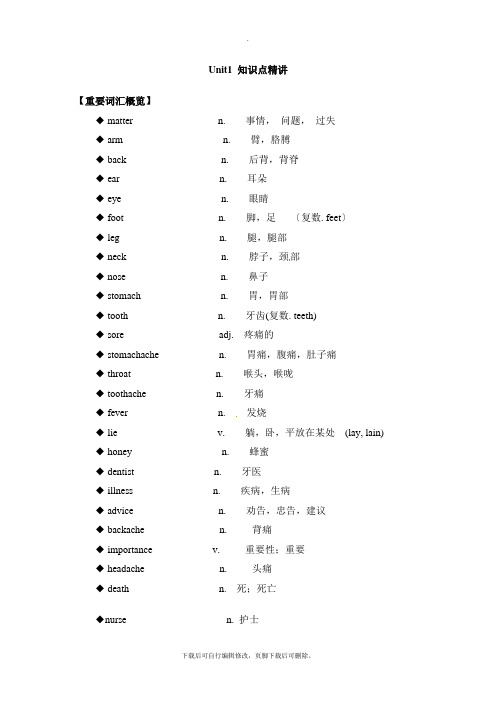
Unit1 知识点精讲【重要词汇概览】◆ matter n.事情,问题,过失◆ arm n.臂,胳膊◆ back n.后背,背脊◆ ear n.耳朵◆ eye n.眼睛◆ foot n.脚,足〔复数. feet〕◆ leg n.腿,腿部◆ neck n.脖子,颈部◆ nose n.鼻子◆ stomach n.胃,胃部◆ tooth n.牙齿(复数. teeth)◆ sore adj.疼痛的◆ stomachache n.胃痛,腹痛,肚子痛◆ throat n.喉头,喉咙◆ toothache n.牙痛◆ fever n.发烧◆ lie v.躺,卧,平放在某处(lay, lain)◆ honey n.蜂蜜◆ dentist n.牙医◆ illness n.疾病,生病◆ advice n.劝告,忠告,建议◆ backache n.背痛◆ importance v. 重要性;重要◆ headache n. 头痛◆ death n. 死;死亡◆nurse n. 护士◆ knife n. (复数.knives)刀【重要词组概览】◆ have a cold患感冒◆ take breaks(take a break) 休息◆ lie down 躺下◆ get off 下车◆ be used to 习惯于...;适应于...◆ on the other hand另一方面◆ get a cold患感冒◆ see a dentist看牙医◆take one’s temperature 量体温◆ make sb sick使某人不舒服(患锁病)◆ have a sore throat嗓子痛◆ have a fever发烧,发热◆ have a toothache牙痛◆ have a backache背痛◆ have a headache头痛◆give up 放弃◆cut off 切除◆get out 〔of〕用尽;耗尽◆take risks〔take a risk〕冒险◆get into 陷入;参与◆right away 立即;马上◆to one’s s urprise 使...惊讶的;出乎...意料【语法知识聚焦】看病需要和医生交流,这是英语口语中必不可少的内容。
Unit1词汇,短语,语法归纳人教版八年级英语下册

八下 unit 1 语法归纳总结询问某人的健康问题及遇到事情麻烦等常用的表达方式1 What's the matter (with xx)?(某人)怎么了?2 What's wrong (with xx)?(某人)怎么了?3 What's the trouble (with xx)?(某人)怎么了?4 What happened (to xx)?(某人)发生了什么事?5 Are you OK? 你没事吧?6 Is there anything wrong with xx? 某人有什么事吗?练一练: What's the matter with your leg? ﹦________ ________ ________ ________ __________?﹦________ ________ ________ ________ __________?表达身体疼痛或不舒服,可用如下结构1. sb + have/ has + 病症Eg: Sb has/ have a cold/ bad cold/ cough/ fever/ temperature/ nosebleed某人有感冒,重感冒,咳嗽,发烧,出鼻血2.sb + has/have + a + 身体部位 + acheEg: Sb has/have a headache / toothache/ earache/ backache/ heartache/ stomachache 某人头痛,牙痛,耳朵疼,后背痛,心痛,胃痛3. sb + has/ have + a sore +发病部位Eg: Sb has/have a sore throat/ eye/ back/ arm某人嗓子疼,眼睛疼,后背疼,胳膊疼4. sb + has/have a pain (pains) in one's + 身体部位Eg:Sb has/have a pain in sb's head/ neck 某人头痛,脖子痛5. sb的某部位 + hurt(hurts)注:hurt的过去式,过去分词还是hurteg: My head hurts. 我头痛 His legs hurts。
人教版英语八年级下册第一单元知识点
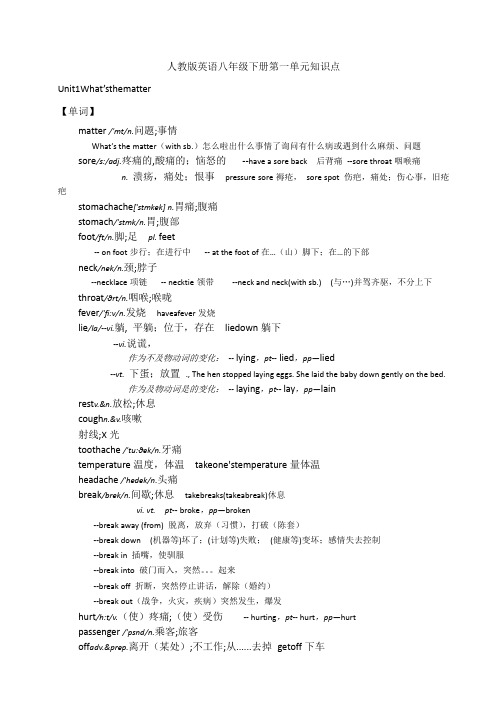
人教版英语八年级下册第一单元知识点Unit1What’sthematter【单词】matter /'mt/n.问题;事情What’s the matter(with sb.)怎么啦出什么事情了询问有什么病或遇到什么麻烦、问题sore/s:/adj.疼痛的,酸痛的;恼怒的--have a sore back 后背痛--sore throat咽喉痛n. 溃疡,痛处;恨事pressure sore褥疮,sore spot 伤疤,痛处;伤心事,旧疮疤stomachache['stmkek] n.胃痛;腹痛stomach/'stmk/n.胃;腹部foot/ft/n.脚;足pl. feet-- on foot步行;在进行中-- at the foot of在…(山)脚下;在…的下部neck/nek/n.颈;脖子--necklace项链-- necktie领带--neck and neck(with sb.) (与…)并驾齐驱,不分上下throat/θrt/n.咽喉;喉咙fever/'fi:v/n.发烧haveafever发烧lie/la/--vi.躺, 平躺;位于,存在liedown躺下--vi.说谎,作为不及物动词的变化:-- lying,pt-- lied,pp—lied--vt. 下蛋;放置., The hen stopped laying eggs. She laid the baby down gently on the bed.作为及物动词是的变化:-- laying,pt-- lay,pp—lainrest v.&n.放松;休息cough n.&v.咳嗽射线;X光toothache /'tu:θek/n.牙痛temperature温度,体温takeone'stemperature量体温headache /'hedek/n.头痛break/brek/n.间歇;休息takebreaks(takeabreak)休息vi. vt.pt--broke,pp—broken--break away (from) 脱离,放弃(习惯),打破(陈套)--break down (机器等)坏了;(计划等)失败;(健康等)变坏;感情失去控制--break in 插嘴,使驯服--break into 破门而入,突然。
新人教版八年级英语下册第一单元知识点

Unit 1 What’s the matter?一.询问某人患了何种疾病或遇到什么麻烦时,常用以下句型:1.What’s the matter (with sb)?2. What’s the trouble / problem (with sb)?3.What’s wrong (with sb)? 你怎么了?4. What’s one’s trouble / problem ?5.What’s up ?6. What happened to sb ?7.Are you OK ? 8. Is there anything wrong with sb ? 二.表达身体不适或疼痛时,常用以下结构:1.Sb + have /has + a / an + 疾病名称:have a cold / fever / cough / temperature2.Sb + have/ has a sore +身体部位:have a sore throat / back3.Sb + have / has+ a+ 身体部位—ache have a toothache /headache / stomachache / earache /backache4.Sb + hurt(s) +身体部位/ oneself ; He hurt his leg . 或身体部位+ hurts ; My head hurts badly .5.There is something wrong with one’s +身体部位。
6.Sb +have /has a pain in one’s +身体部位三.情态动词should / should’t 的用法:意为’应该,应当’后接动词原形,无人称和数的变化。
通常表示提出意见或建议,或义务和责任,还可表示命令责备或要求等语气;1. You should lie down and rest .2.You should’t eat so much next time .3. What should I do ?4. Should I put some medicine on it ?----Yes ,you should ./ No, you should’t. Section A1.sore adj. 疼痛的可作定语或表语She has a sore throat / back . My leg is verysore .2.back n. 后面,背面He sat at the back of the classroom. adv . 回(原处)come back3. lie 躺,卧---lay. lain.lying lie down 躺下撒谎---lied.lied .lying You are lying to me .n. 谎言假话tell a lie / lies lay .---laid .laid. laying 产卵下蛋放置4. rest 休息v./n. You should rest for a few days . get some rest= have(take) a rest /a break / breaks休息一下5. to one ‘s surprise 使某人惊讶的是常作插入语,位于句首To his surprise,she failed the exam .in surprise 吃惊地surprising ----物What surprising news ! Surprised---- 人be surprised to do / be surprised at sth / be surprised that…6. much too+ 形容词,太...... ,too many+可数名词复数,太多……too much+不可数名词,太多…也可做副词talk too much7. enough形容、副词,足够的/地,(1) enough +名词; enough water (2) 形副+ enough ; good enough8. sound like+名词代词和从句:听起来像It sounds like you don’t know the truth.. It sounds like a good idea.Sound( look/feel/taste/smell )+形容词听起来... eg. The music sounds nice.9. need (1).需要,实义动词人作主语need+sth,需要某物;need (sb)to do sth.需要做某事,(2). 物作主语;sth needs doing/ to be done ; The room needs cleaning /to be cleaned.(3) 情态动词,多用于否定句或疑问句Need I stay here ?---Yes, you must . /No, you need’t.10. agree 同意,赞同---disagree(反义词) agree with sb. 同意某人agree to do. 同意做某事11. right away =right now =at once,意为马上。
八年级下册英语1单元含答案

一、单元单词每天20个,背完听写或默写,写中文写词性,要批改。
二、重点词组句式Section A1.What’s the matter with you?=What’s the trouble with you ?=What’s wrong with you?P1 1a用I have/He has a......句式连接背诵2.have a toothache 牙痛3.have a fever 发烧4.have a cold 感冒5.have a stomachache 胃痛6.have a sore back 背痛7.have a sore throat 喉咙痛P2 2b用“ You have a fever. You should.....”类似的句式连接两边词组,组成句子背诵8.lie down and rest 躺下来休息9.drink some hot tea with honey 喝带蜂蜜的热茶10.see a dentist and get an X-ray 看牙医照X光11.take your temperature 量体温12.put some medicine on it 敷药在上面2d 熟读对话,背诵P3 3a13.Bus N0. 26 was going along Zhonghua Road when the drive saw an old man lying on the side of the road.当车子行驶在中华路上的时候,司机看到一位老人正躺在路边。
14.without thinking twice 毫不犹豫15.get off 下车16.He told the passengers that he must take the man to the hospital.此句为宾语从句,主句时态是过去式,情态动词must 没有过去时态,后面接动词原形。
17.expect sb to do sth 期待某人做某事18.move the man onto the bus 把人搬到车上去19.Thanks to ... 多亏了......= because of... 因为...... 后面都接短语。
人教版英语八年级下册第1单元重点知识汇总
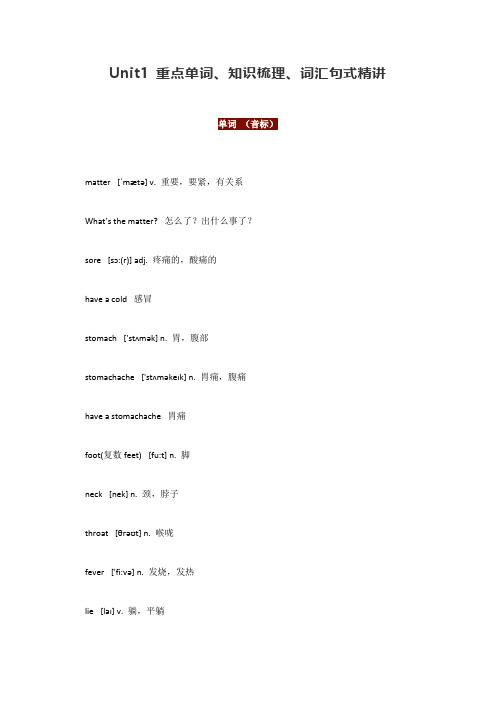
Unit1 重点单词、知识梳理、词汇句式精讲matter [ˈmætə] v. 重要,要紧,有关系What’s the matter? 怎么了?出什么事了?sore [sɔ:(r)] adj. 疼痛的,酸痛的have a cold 感冒stomach ['stʌmək] n. 胃,腹部stomachache ['stʌməkeɪk] n. 胃痛,腹痛have a stomachache 胃痛foot(复数feet) [fu:t] n. 脚neck [nek] n. 颈,脖子throat [θrəʊt] n. 喉咙fever ['fi:və] n. 发烧,发热lie [laɪ] v. 躺,平躺lie down 躺下rest [rest] n. 剩余部分,其余;放松,休息cough [kɒf] n. & v. 咳嗽X-ray ['eksreɪ] n. X光,X射线toothache [ˈtu:θeɪk] n. 牙痛take one's temperature 量体温headache [ˈhedeɪk] n. 头痛have a fever 发烧break [breɪk] n. & v. 休息,暂停;打破take breaks (take a break)休息hurt [hə:t] v. 伤害,损害,使受伤,疼passenger ['pæsɪndʒə] n. 乘客,旅客off [ɒf] adv. prep. 离开(某处);从…去掉get off 下车to one's surprise 使…惊讶,出乎…意料onto [ˈɒntə] prep. 向,朝trouble [ˈtrʌbl] n. 麻烦,烦扰,问题hit [hit] n. & v. 碰撞,打,打击right away 立即,马上get into 陷入,参与herself [hə:ˈself]她自己,她本身(she的反身代词)bandage ['bændɪdʒ] n. & v. 绷带;用绷带包扎sick [sɪk] adj. 患病的,不适的knee [ni:] n. 膝盖nosebleed [ˈnəʊzbli:d] n. 鼻出血breathe [bri:ð] v. 呼吸sunburned [ˈsʌnbɜ:nd] adj. 晒伤的ourselves [ɑ:ˈselvz]我们自己(we的反身代词)climber [ˈklaɪmə(r)] n. 登山者be used to 习惯于… 适应于…risk [rɪsk] n. & v. 风险,危险;冒险take risks (take a risk) 冒险accident [ˈæksidənt] n. 意外事件;事故situation [ˌsitjuˈeiʃən] n. 状况,形式,情况kg=kilogram [ˈkɪləgræm] n. 公斤,千克rock [rɔk] n. 岩石run out (of) 用尽,耗尽knife [naif] n. 刀,餐刀cut off 切除blood [blʌd] n. 血mean [mi:n] v. 意味着,意思是,意欲get out of 离开,从… 出来importance [ɪmˈpɔ:tns] n. 重要性decision [dɪ'sɪʒn] n. 决心,决定,抉择control [kən'trəʊl] v. 控制,支配,操纵be in control of 掌管,管理spirit ['spɪrɪt] n. 勇气,意志death [deθ] n. 死亡give up 放弃nurse [nə:s] n. 护士Judy 朱迪(女名)Nancy 南希(女名)Mandy 曼迪(女名)Aron Ralston 阿伦·罗尔斯顿Utah 尤他州(美国)Unit1 知识梳理【重点单词】matter [ˈmætə] v. 重要,要紧,有关系What’s the matter? 怎么了?出什么事了?sore [sɔ:(r)] adj. 疼痛的,酸痛的have a cold 感冒stomach ['stʌmək] n. 胃,腹部stomachache ['stʌməkeɪk] n. 胃痛,腹痛have a stomachache 胃痛foot(复数feet) [fu:t] n. 脚neck [nek] n. 颈,脖子throat [θrəʊt] n. 喉咙fever ['fi:və] n. 发烧,发热lie [laɪ] v. 躺,平躺lie down 躺下rest [rest] n. 剩余部分,其余;放松,休息cough [kɒf] n. & v. 咳嗽X-ray ['eksreɪ] n. X光,X射线toothache [ˈtu:θeɪk] n. 牙痛take one's temperature 量体温headache [ˈhedeɪk] n. 头痛have a fever 发烧break [breɪk] n. & v. 休息,暂停;打破take breaks (take a break)休息hurt [hə:t] v. 伤害,损害,使受伤passenger ['pæsɪndʒə] n. 乘客,旅客off [ɒf] adv. prep. 离开(某处);从…去掉get off 下车to one's surprise 使…惊讶,出乎…意料onto [ˈɒntə] prep. 向,朝trouble [ˈtrʌbl] n. 麻烦,烦扰,问题hit [hit] n. & v. 碰撞,打,打击right away 立即,马上get into 陷入,参与herself [hə:ˈself] pron. 她自己,她本身(she的反身代词)bandage ['bændɪdʒ] n. & v. 绷带;用绷带包扎sick [sɪk] adj. 患病的,不适的knee [ni:] n. 膝盖nosebleed [ˈnəʊzbli:d] n. 鼻出血breathe [bri:ð] v. 呼吸sunburned [ˈsʌnbɜ:nd] adj. 晒伤的ourselves [ɑ:ˈselvz] pron. 我们自己(we的反身代词)climber [ˈklaɪmə(r)] n. 登山者be used to 习惯于… 适应于…risk [rɪsk] n. & v. 风险,危险;冒险take risks (take a risk) 冒险accident [ˈæksidənt] n. 意外事件;事故situation [ˌsitjuˈeiʃən] n. 状况,形式,情况kg=kilogram [ˈkɪləgræm] n. 公斤,千克rock [rɔk] n. 岩石run out (of) 用尽,耗尽knife [naif] n. 刀,餐刀cut off 切除blood [blʌd] n. 血mean [mi:n] v. 意味着,意思是,意欲get out of 离开,从… 出来importance [ɪmˈpɔ:tns] n. 重要性decision [dɪ'sɪʒn] n. 决心,决定,抉择control [kən'trəʊl] v. 控制,支配,操纵be in control of 掌管,管理spirit ['spɪrɪt] n. 勇气,意志death [deθ] n. 死亡give up 放弃nurse [nə:s] n. 护士【重点短语】1.have a fever 发烧2.have a cough 咳嗽3.have a toothache 牙疼4.talk too much 说得太多5.drink enough water 喝足够的水6.have a cold 受凉;感冒7.have a stomachache 胃疼8.have a sore back 背疼9.have a sore throat 喉咙痛10. take risks 冒险11.hot tea with honey 加蜂蜜的热茶12.see a dentist 看牙医13.get an X-ray 拍X 光片14.take one’ s temperature 量体温15.put some medicine on sth. 在……上面敷药16. give up 放弃17. sound like 听起来像18. all weekend 整个周末19. in the same way 以同样的方式20. go to a doctor 看医生21. go along 沿着……走22. on the side of the road 在马路边23. shout for help 大声呼救24. without thinking twice 没有多想25. get off 下车26. have a heart problem 有心脏病27. to one’ s surprise 另某人惊讶的是28. thanks to 多亏了;由于29. in time 及时30. make a decision 做出决定31. get into trouble 造成麻烦32. right away 立刻;马上33. because of 由于34. get out of 离开;从……出来35. keep on doing sth. 继续或坚持做某事36. put a bandage on sth. 用绷带包扎37. fall down 摔倒38. feel sick 感到恶心39. have a nosebleed 流鼻血40. cut his knee 割伤他的膝盖41. put her head back 把她的头向后仰42. have problems breathing 呼吸困难43. mountain climbing 登山运动44. be used to doing sth. 习惯做某事45. run out (of) 用完;用尽46. so that 以便47. so...that... 如此……以至于...…48. be in control of 掌管;管理49. in a difficult situation 在闲境中【重点句型】1. What's the matter with you?= What'the trouble with you?= What's wrong with you? 你怎么了?2. What should she do? 她该怎么办呢?3.Should I take my temperature? 我应该量一下体温吗?4.You should lie down and rest. 你应该躺下休息一会儿。
八年级下册英语书第1单元单词
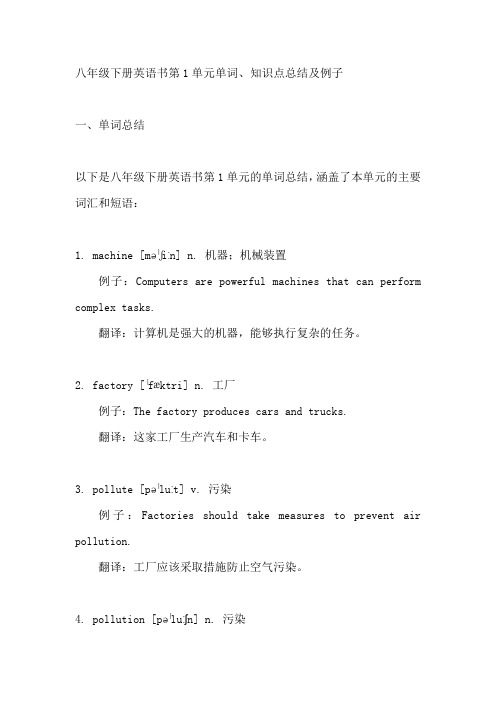
八年级下册英语书第1单元单词、知识点总结及例子一、单词总结以下是八年级下册英语书第1单元的单词总结,涵盖了本单元的主要词汇和短语:1. machine [məˈʃiːn] n. 机器;机械装置例子:Computers are powerful machines that can perform complex tasks.翻译:计算机是强大的机器,能够执行复杂的任务。
2. factory [ˈfæktri] n. 工厂例子:The factory produces cars and trucks.翻译:这家工厂生产汽车和卡车。
3. pollute [pəˈluːt] v. 污染例子:Factories should take measures to prevent air pollution.翻译:工厂应该采取措施防止空气污染。
4. pollution [pəˈluːʃn] n. 污染例子:Water pollution is a serious problem in many developing countries.翻译:水污染是许多发展中国家面临的严重问题。
5. recycle [ˌriːˈsaɪkl] v. 回收利用例子:It's important to recycle paper and plastic to protect the environment.翻译:回收纸张和塑料对保护环境很重要。
6. waste [weɪst] n. 浪费;废弃物例子:Reducing food waste is a crucial step towards sustainability.翻译:减少食物浪费是迈向可持续性的关键一步。
7. problem [ˈprɒbləm] n. 问题;难题例子:Climate change is a global problem that requires international cooperation.翻译:气候变化是一个需要国际合作解决的全球性问题。
人教版英语八年级下册Unit1知识点和练习(无答案)
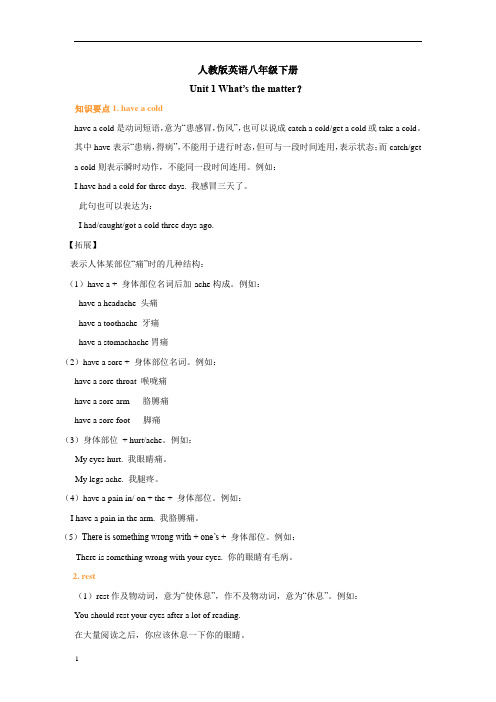
人教版英语八年级下册Unit 1 What’s the matter?知识要点1. have a coldhave a cold是动词短语,意为“患感冒,伤风”,也可以说成catch a cold/get a cold或take a cold。
其中have表示“患病,得病”,不能用于进行时态,但可与一段时间连用,表示状态;而catch/geta cold则表示瞬时动作,不能同一段时间连用。
例如:I have had a cold for three days. 我感冒三天了。
此句也可以表达为:I had/caught/got a cold three days ago.【拓展】表示人体某部位“痛”时的几种结构:(1)have a + 身体部位名词后加-ache构成。
例如:have a headache 头痛have a toothache 牙痛have a stomachache胃痛(2)have a sore + 身体部位名词。
例如:have a sore throat 喉咙痛have a sore arm 胳膊痛have a sore foot 脚痛(3)身体部位+ hurt/ache。
例如:My eyes hurt. 我眼睛痛。
My legs ache. 我腿疼。
(4)have a pain in/ on + the + 身体部位。
例如:I have a pain in the arm. 我胳膊痛。
(5)There is something wrong with + one’s + 身体部位。
例如:There is something wrong with your eyes. 你的眼睛有毛病。
2. rest(1)rest作及物动词,意为“使休息”,作不及物动词,意为“休息”。
例如:You should rest your eyes after a lot of reading.在大量阅读之后,你应该休息一下你的眼睛。
八年级英语下册Unit1 知识梳理(重要句型、重点单词、短语解析及练习)

八年级英语下册Unit1 知识梳理(重要句型、重点单词、短语解析及练习)课文翻译:Section A 会话Role-play the conversation. 角色扮演对话。
Lisa, are you OK? 丽莎,你还好吗?I have a headache and I can't move my neck. 我头痛,我的脖子不能动了。
What should I do? 我头痛,我的脖子不能动了。
Should I take my temperature? 我应该测测体温吗?No, it doesn't sound like you have a fever. 不,你看起来不像是发烧了。
What did you do on the weekend? 你周末做什么了?I played computer games all weekend. 我整个周末都在玩电脑游戏。
That's probably why. 这可能就是你头痛的原因了。
You need to take breaks away from the computer. 你需要休息并且远离电脑。
Yeah, I think I sat in the same way for too long without moving. 是的,我想我是因为以同样的姿势坐的太久没有动。
I think you should lie down and rest. 我想你应该躺下休息。
If your head and neck still hurt tomorrow, then go to a doctor. 如果明天你的头部和颈部还疼,再去看医生。
OK. Thanks, Mandy. 好。
谢谢你,曼蒂。
Section A 短文Read the passage. 阅读下面的短文。
Do you think it comes from a newspaper or a book? 你认为这篇短文是出自一份报纸还是一本书?How do you know? 你是怎么知道的?Bus Driver and Passengers Save an Old Man 公交车司机和乘客救了一位老人At 9:00 a.m. yesterday, bus No. 26 was going along Zhonghua Road when the driver saw an old man lying on the side of the road. 在昨天上午9点,当司机看到一位老人躺在路边,26路公交车正在沿中华路行驶。
